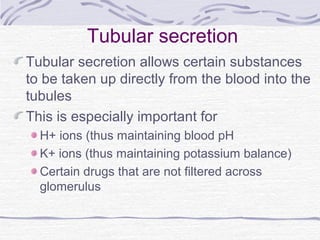The nephron is the functional unit of the kidney that filters blood to form urine. Glomerular filtration occurs when blood plasma filters through the glomerulus into the nephron tubules. Reabsorption and tubular secretion then alter the filtrate's composition as it travels through the tubules. Reabsorption moves substances like water, ions, and glucose from the filtrate back into blood to concentrate the urine. Tubular secretion actively transports substances like hydrogen ions and potassium into the filtrate. Together these processes determine the final volume, concentration and composition of urine to regulate blood chemistry and remove waste.













